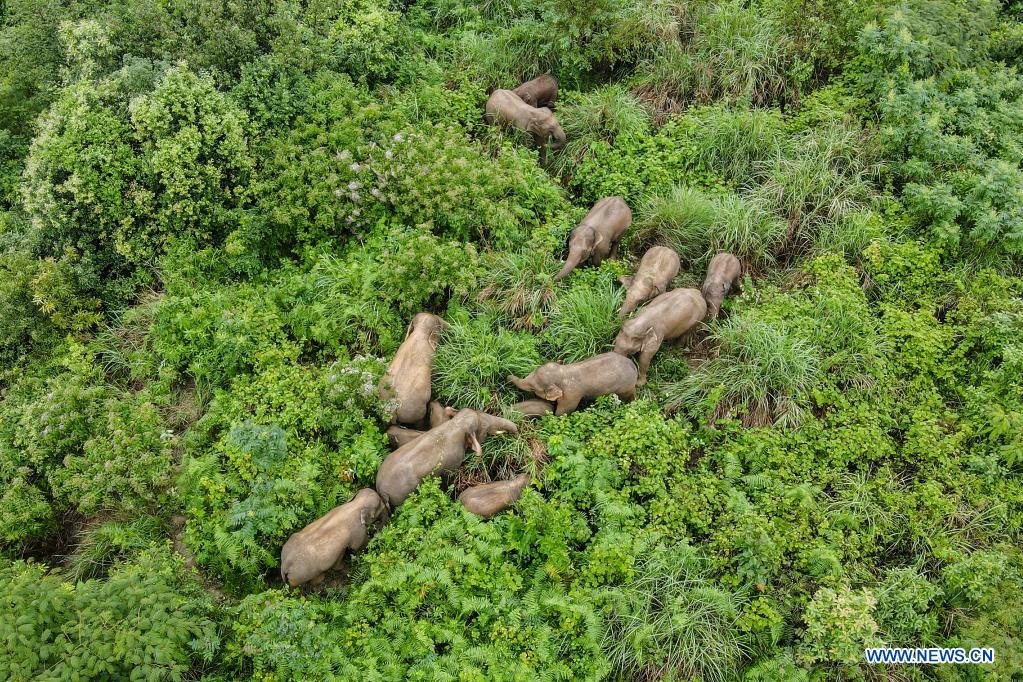China's elephant herd sends key environmental message
By Xueli Wu | chinadaily.com.cn | Updated: 2021-08-30 13:47

Earlier this month, Yunnan's migrating elephant herd headed back home. Since last year, the herd attracted attention worldwide for its unusual migration. On March 15, 2020, the herd left its home in Xishuangbanna Dai Autonomous Prefecture in Yunnan, and began its journey north.
During the march, the herd visited villages and towns, passed through counties and cities, played in both water puddles and mud, helped themselves to immense feasts offered by locals from their crop fields, and welcomed two newborns into the family. After 17 months of trekking, the herd finally decided, "East or West, home is best." Under the guidance and escort of the local police, they are on their way home.
However, the travel journal of the herd could have resulted in a completely different story were it not for the support and cooperation of both the local authorities and residents. Instead of abruptly shipping the herd back to their original habitat, the government guided them with food, tracked them with flying drones and directed them with blocked roads. Strictly following the instructions of police, more than 150,000 people were evacuated and, to date, no casualties have been reported. Even as the herd encroached on various communities along the path, their journey has left zero injuries on both ends.
What's more, local residents have shown understanding and generosity, letting the herd feed on their crops and explore their dwellings. It's now clear why this migration has captured the fascination of the world, beyond the fact that it lasted so long and involved an adorable herd of elephants. The most important reason the event landed in the spotlight was the joint efforts of the government and residents to ensure the safety of both animals and humans.
As a matter of fact, the elephant herd has become an active influencer on the internet. People keep track of the latest reports about them, marvel at how cute they are, and find themselves touched by witnessing the peaceful coexistence of nature and civilization. Nevertheless, all of this could distract from the root problem that led to the unusual migratory behavior. The herd's journey northward was not a leisurely holiday, but rather a journey in search of a more suitable home and better life.
While the cause of this uncommon migratory phenomenon still remains unknown, it could reflect some serious underlying environmental problems yet to be detected. Whether the herd left to seek a larger territory due to the rising elephant population or because of the declining quality of the original habitat, the trek should sound the alarm of a rising desperation among wild animals for a more ideal habitat and the expectation of more such events to come in the following years. Furthermore, the herd failed to find a better territory, sending the distressing message of the urgency to conserve the Earth's few remaining big ecosystems to sustain larger species of animals.
The herd's migration once again highlights one aspect of the many pressing environmental issues our world faces, such as climate change, shortage of natural resources and above all, the ongoing COVID-19 pandemic. What lessons can we learn? What experience can we draw from this event? From my perspective, we'll probably witness more unusual wanderings of wild animals in the near future. But are we ready for this? The government must build up a management system in response to wildlife migrations on such a large scale, particularly those that cover long distances, as well as a more efficient capacity to mobilize social resources to ensure the safety of both humans and animals.
Still, this would not suffice because it still fails to address the core problem. Thus, it is vital that more concrete actions should be taken to uncover and resolve what afflicted the elephants and forced them to migrate. Last but not least, great concern about the elephants shows that people tend to be motivated more by lively reports and photos of animals, as opposed to vague or more formal concepts like degradation and deforestation. So, as we are living out the idea of sustainable development, telling more evocative stories that inspire hope and capture people's minds can be a great way to spur action among the general public.
As the elephants are on the road to a greener home, we humans are also on the way to a brighter future. We still have a long way to go in sustainable development with new barriers surfacing from time to time and old challenges that remain unresolved.
Nevertheless, China is dedicated to fulfilling its promise of peak carbon emissions by 2030 and carbon neutrality by 2060. We've seen the Mu Us Desert turn into an oasis and wildlife brought back from the brink in the past. So I believe we'll see the harmonious coexistence of man and nature in the future as well. Let's hope future generations of humans and wild animals will be able to bask in the warm sunshine of a better world together.
Xueli Wu is from Guangdong University of Foreign Studies.
The opinions expressed here are those of the writer and do not necessarily represent the views of China Daily and China Daily website.
If you have a specific expertise, or would like to share your thought about our stories, then send us your writings at opinion@chinadaily.com.cn, and comment@chinadaily.com.cn.
























